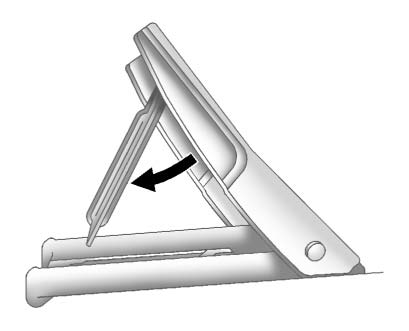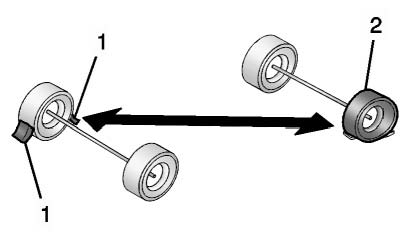Chevrolet Cruze Owners Manual: If a Tire Goes Flat
It is unusual for a tire to blowout while driving, especially if the tires are maintained properly. If air goes out of a tire, it is much more likely to leak out slowly. But if there ever is a blowout, here are a few tips about what to expect and what to do: If a front tire fails, the flat tire creates a drag that pulls the vehicle toward that side. Take your foot off the accelerator pedal and grip the steering wheel firmly. Steer to maintain lane position, and then gently brake to a stop, well off the road, if possible.
A rear blowout, particularly on a curve, acts much like a skid and may require the same correction as used in a skid. Stop pressing the accelerator pedal and steer to straighten the vehicle. It may be very bumpy and noisy. Gently brake to a stop, well off the road, if possible.
WARNING
Driving on a flat tire will cause permanent damage to the tire.
Re-inflating a tire after it has been driven on while severely underinflated or flat may cause a blowout and a serious crash.
Never attempt to re-inflate a tire that has been driven on while severely underinflated or flat.
Have your dealer or an authorized tire service center repair or replace the flat tire as soon as possible.
WARNING
Lifting a vehicle and getting under it to do maintenance or repairs is dangerous without the appropriate safety equipment and training. If a jack is provided with the vehicle, it is designed only for changing a flat tire. If it is used for anything else, you or others could be badly injured or killed if the vehicle slips off the jack. If a jack is provided with the vehicle, only use it for changing a flat tire.
If a tire goes flat, avoid further tire and wheel damage by driving slowly to a level place, well off the road, if possible. Turn on the hazard warning flashers.
WARNING
Changing a tire can be dangerous. The vehicle can slip off the jack and roll over or fall causing injury or death. Find a level place to change the tire. To help prevent the vehicle from moving: 1. Set the parking brake firmly.
2. Put an automatic transmission in P (Park) or a manual transmission in 1 (First) or R (Reverse).
3. Turn off the engine and do not restart while the vehicle is raised.
4. Do not allow passengers to remain in the vehicle.
5. Place wheel blocks on both sides of the tire at the opposite corner of the tire being changed.
This vehicle may come with a jack, spare tire, and wheel block(s) or a tire sealant and compressor kit. To use the jacking equipment to change a spare tire safely, follow the instructions below.

To use the wheel blocks, lift the wheel block and lock it into place.
When the vehicle has a flat tire (2), use the following example as a guide to assist in the placement of the wheel blocks (1).

1. Wheel Block
2. Flat Tire
The following information explains how to repair or change a tire.
 Tire Chains
Tire Chains
WARNING
Do not use tire chains. There is not enough clearance. Tire chains used on
a vehicle without the proper amount of clearance can cause damage to the brakes,
suspension, or other vehicle pa ...
 Tire Sealant and Compressor Kit
Tire Sealant and Compressor Kit
WARNING
Idling a vehicle in an enclosed area with poor ventilation is dangerous. Engine
exhaust may enter the vehicle. Engine exhaust contains carbon monoxide (CO) which
cannot be seen or smelled ...
Other materials:
Intermediate Steering Shaft Replacement
Removal Procedure
Turn the steering wheel to the straight forward position and support it
from movement
Remove the 2 intermediate steering shaft bolts (1).
Remove the intermediate steering shaft (1).
Installation Procedure
Install the intermediate steering shaft ...
Radio(s)
: Press to turn the system on and
off. Turn to increase or decrease the volume.
BAND: Press to choose between FM, AM, or SiriusXM®, if equipped.
MENU/SEL: Turn to select radio stations. Press to select a menu.
: Press to seek the previous station
or track.
: Press to seek the next station
...
Immobilizer Operation
This vehicle has a passive theft-deterrent system.
The system does not have to be manually armed or disarmed.
The vehicle is automatically immobilized when the key is removed from the ignition.
The system is automatically disarmed when the vehicle is started with the correct
key. The key uses a ...
